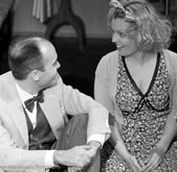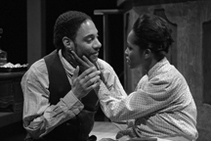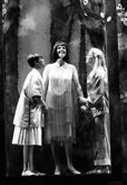|
Jacqueline Lawton: How long have you lived and worked as a playwright in DC? What brought you here? Why have you stayed?
Allyson Currin: I have been in DC since 1990. I came here after a stint teaching drama in Switzerland because all of my friends from grad school were getting theatre work here. I had always wanted a smaller city for my career, but the main reason I stayed was that I got theatre work! I've worked in theatre pretty nonstop for my nearly 22 years here. I've been able to stay creatively fulfilled, but also have been able to have a family and a family-friendly lifestyle. JL: Have you ever been a member of a DC area playwrights writing group? If so, did you find it useful? Would you recommend that other playwrights join them? AC: When I first got to town, and for several years after that, The Playwrights Forum was great, just for networking, getting feedback, inspiring creative work and getting readings on their feet. When Charter was producing, I was heavily involved with them, but now they've morphed into First Draft (I'm this season's Resident Playwright with them). I'm currently involved with DC Area Playwrights and have really enjoyed the solidifying of the playwriting community here in DC. JL: In DC, we have the Capital Fringe Festival, the Intersections Festival, the Source Theatre Festival, the Kennedy Center's Page-to-Stage Festival, the Black Theater Festival, and the Hip Hop Theatre Festival. We also have the Mead Lab at Flashpoint Theater Lab Program. Have you participated in any of these? If so, can you speak about your experience? AC: I've done two shows in the Fringe - one of which I produced myself, the other of which another group produced. It's great for what it is, but it ended up costing me a lot of money. I've also done commissioned work for the Source Festival and was administratively very much a part of it back in the 90's. I LOVE Ken Cen's Page-to-Stage and have had something in it pretty much every year since it started. Great energy in that particular project! JL: What kind of work do you do to pay the bills? How do you balance this work with your writing? AC: My early years in DC I worked in PR and fundraising for Source Theatre Company. I'm also an actor, and have acted steadily since first getting into town (Olney, Signature, Studio, WSC, WSG, American Century Theatre, etc.) but we all know THAT doesn't pay the bills. By the mid-90's, I had switched to education as a day job, teaching here and there in a pretty scattershot fashion (Imagination Stage, PG Community College, etc.) until in one slam-dunk year I started to teach playwriting at THREE colleges all at once - St. Mary's, Goucher, and George Washington University. Once the dust settled, I was part of the "regular part-time" theatre faculty at GWU, where I've been for the past 14 years. It's a great job for a theatre person - if I'm not acting or writing or in rehearsal for something, getting to talk about nothing but theatre in the classroom is a pretty delightful alternative. I have always been a nighttime writer, so having a daytime job hasn't really cut into my creative time. (Raising my kids does, though!) JL: How many plays have you had produced in the DC area? Were any of these plays self-produced? If so, where and what did you learn from that experience? AC: I have had 21 of my plays produced in DC. (I'm including operettas and multi-media pieces in this number) Of those 21, 10 were my original scripts (I'm including an upcoming premiere in the 2012-13 season), 4 were commissioned plays or musicals, and 7 were multi-media pieces, operettas or other short commissioned works. There have been workshop and festival productions in addition, as well as work in other cities, but I'm only counting world premieres in DC. I have self-produced (I'm not counting festivals here either) three times, although each time I had a committed team of collaborators alongside me. It's a tough way to do business, but also very satisfying, particularly if there is nothing theatrical on the horizon with an established theatre. But you work HARD. I would definitely do it again, though - only with collaborators. JL: If you could be produced at any theatre in DC, which would it be and why? AC: I wouldn't say no to many of them! I love Rorschach's aesthetic, admire Woolly's, and have never been produced by either. Round House - never been produced there - or Theatre J. I like the mid-size houses and the little black boxes. JL: DC audiences are ... AC: ...HAVE changed a lot in my twenty-odd years here in town. They are SO much more respectful of new work than they used to be. They've really been educated about the process of developing new plays and are energetic and appreciative of what it takes to get new work on its feet. They are also hungry for "good stories, well told" and respond generously (I'm speaking of both applause and money here) when they get them. I love DC audiences. They've been very good to me. JL: DC actors, designers and directors are ... AC: Okay, that's like asking me to pick a favorite child! The DC theatre community was, is, and I'm sure will continue to be, pretty freaking amazing! It is a giving, generous community that really knows how to stick together. I am an actor, so of course I LOVE actors! I just adore writing a role specifically for one of my friends to play - it helps me to specify a character's voice. Designers: we need more! I love to work with them - actually get excited by their insights and processes and creative problem-solving - but there just aren't enough of them, especially for lower-budget projects. As for directors...of course I have a bias for directors who really have a genius for new work and I have a nice long list of directors I have worked with, or want to work with soon. Some directors just don't thrive in the land of new play development - which is fine, they excel in other types of theatre direction - but a strong dramaturgical streak is something I obviously seek in a director. JL: DC critics are ... AC: ...finally, I THINK, starting to understand that DC is a real theatrical powerhouse. Historically, there has been a faint undercurrent of "DC isn't New York City" running through a lot of criticism, a prejudice jettisoned ages ago by the artistic community. It seems to me that the critics are finally latching on to the idea of DC as a legitimate and powerful artistic community that has true gravitas. It's hard to talk about critics without talking about bloggers, though, and I think there is a huge difference between criticism and opinion. There's no shortage of opinion out there, which is NOT the same thing as classical criticism. I probably sound like a complete luddite here, but I would love for there to be a clearer understanding out there of the difference between the two. JL: How do you feel the DC theatre community has addressed the issues of race and gender parity ? How has this particular issue impacted you and your ability to get your work produced on the main stages? AC: Ugh. Gender parity is such a hot and troublesome topic right now. As a seasoned female professional, I can certainly attest to the fact that I have felt that my gender was a bit of a roadblock now and then. I've watched my male peers move faster than I have career-wise. And, of course, I'm in the classic position of raising my children by myself (since my husband's death seven years ago), and trying to squeeze in a career as well - not an easy task. But overall, I can't complain about the career I've had. To date, I've been luckier than most, and definitely feel that I am writing at the top of my game. The reality in DC seems to be that certain theatres are open and sensitive to the gender parity questions, and other theatres less so. (Whether or not it has to do with their individual missions, or the alternative ways they seek to employ female artists, I wouldn't speculate.) The bottom line is that male playwrights are produced more often. That is just mathematical fact, which of course I find enormously frustrating. The discussion of the issue always helps, but talkin' ain't doin'! As to race: DC's creative community has been, in my experience, pretty sensitive, consistent and responsible when it comes to exploring issues of race. More sensitive, consistent and responsible than it is when exploring issues of gender, actually. The onstage dialogue about race has gotten more thoughtful, complex, respectful and layered. At least when I look at the evolution of that dialogue over my two decades here. JL: What advice do you have for an up and coming DC based playwright or a playwright who has just moved to D.C.? AC: Connect with other playwrights. First and foremost. Build a network and do whatever it takes to get your work seen. JL: What's next for you as a playwright? Where can we keep up with your work? AC: I am working on several new plays, as always, including CAESAR AND DADA and one of those is a new commissioned musical for Signature Theatre (with composer-lyricist-all-around-fabulous-guy Matt Conner). I will be First Draft's Resident Playwright this coming season, so that means at least one staged reading of something brand new next season. I am working with Cincinnati Playhouse on some commissioned work as well. The Actors Salon is taking some of my plays to NYC for workshops in the fall. I'm also gearing up to make the switch from Vice Chair to Chair of National Playwriting Program (Region 2) of the Kennedy Center's American College Theatre Festival. THAT keeps me hopping. Plus, I'm still teaching at GWU and running its New Play Festival in the spring semester. (I'm tired just typing that. But work is good!) Also, visit my website: www.allysoncurrin.com
0 Comments
Your comment will be posted after it is approved.
Leave a Reply. |
My BlogI'm a playwright, dramaturg, and teaching artist. It is here where you'll find my queries and musings on life, theater and the world. My posts advocate for diversity, inclusion, and equity in the American Theatre and updates on my own work. Please enjoy!
Categories
All
Archives
June 2020
Reading List
|



